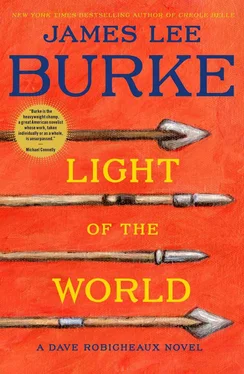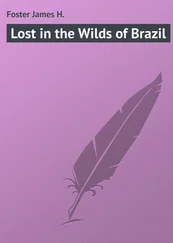“What do you mean by ‘unusual’?” he said.
“Apparitions.”
“You saw something?”
“Not me. Wyatt Dixon may have,” I said.
“One time at sunset, I thought I saw dark-skinned people coming over the ridge and walking down the trail through the trees. I went outside, and nobody was there. Another time, when there was heavy fog, I could hear people talking up there. I walked about fifty yards up the hillside and heard a child crying. I also found the stone head of a tomahawk. I had been over that same spot many times, but I’d never seen any artifacts there.”
“What happened to Chief Joseph and his people?”
“The army put them all on cattle cars and shipped them to a mosquito-infested sinkhole in Oklahoma. What are you getting at?”
“I don’t want to believe that people like Wyatt Dixon have an accurate vision of either this world or the next.”
“Did you know the word ‘Kentucky’ comes from a Shawnee word for ‘bloody land’?”
“What’s the point?”
“When you kill large numbers of people in order to steal their land, they get pissed off, and their spirits have a way of hanging around,” he replied.
I wasn’t up to a barrage of Albert’s morbid polemics, so I went to find Clete. But he had gone off on his own and had not told anyone of his destination. I should have known a bad moon was on the rise.
The saloon where they had arranged to meet was down by the railroad tracks, in a part of town where the brick shell of a three-story nineteenth-century brothel was still standing and cowboys and Indians and bindle stiffs and rounders and bounders and midnight ramblers still knocked back doubles and chased them with pitcher beer. Clete was drinking at the far end of the bar when she entered. The front door was open to allow in the cool of the evening, and the redness of the late sun backlit her hair and the creamy texture of her shoulders and the beige skirt that swirled around her knees. He raised his hand awkwardly to indicate where he was, then tipped his shot glass to his mouth as she approached him.
“Is this place okay?” he said.
“Why wouldn’t it be?”
“It gets a little rough sometimes.”
“I like it here. They have a western band on Saturday nights,” she replied, sitting on a stool.
“What are you drinking?”
She looked at the shot glass and the small pitcher of draft beer in front of him. She touched the condensation on the pitcher with the ball of her index finger. “A glass of this will be fine,” she said.
“You like Indian culture?”
“Excuse me?”
“The way you dress and all.”
“I wanted to get out of New Orleans as soon as I could. When I had the chance, I took it. Now I live out in the West. It’s clean out here.”
He looked out the door, then back at her. He wasn’t sure what he was supposed to say. “Some people think Missoula is turning into Santa Fe.”
“I wouldn’t know. I’ve never been there. It’s the model for something?”
“I’ve never been there, either,” he replied, feeling more and more inept and wondering why he had agreed to meet her.
“There’s always time,” she said. She held his eyes. “Isn’t that the way you look at it?”
Time for what? He ordered a draft beer for the woman and another shot for himself. He waited until the bartender had filled and set down their glasses and walked away. “You said maybe I could help you with something.”
“You and your friend were talking to Dixon. He sold my daughter a bracelet before she died. Do you think he could have killed her?”
“I don’t doubt he’s a dangerous man.”
“Dangerous to women?”
Clete was standing at the bar, one foot resting on the brass rail. In the mirror, he could see her looking at his profile, her face tilted upward. “Who am I to be judging others?” he replied.
“You looked angry when you were talking to him. I don’t think you hide your feelings well. I think we’re a lot alike.”
“In what way?”
“You’re not ashamed of your emotions.”
“I don’t know if I’d put it that way. I don’t like criminals. Sometimes you meet a guy who’s been inside and is on the square, but not too often. Anyone who’s been down at least twice is probably a recidivist and will be in and out of the can the rest of his life.”
“Why won’t you answer my question?”
“A man who strikes a woman is a physical and moral coward. There’s no exception to that rule. We call them misogynists. The simple truth is, they’re cowards. Dixon is a head case and probably a lot of other things, but a coward isn’t one of them. I hate admitting that.”
“What is it you don’t like about him?”
“I don’t like reborn morons who say they understand the mind of God.”
“Could he have been working with someone else?”
“He’s a loner. Most rodeo people are. I got to ask you something, Miss Felicity. The Wigwam, the bar Angel was drinking in the night she died? It was full of outlaw bikers. A lot of those guys are sexual fascists and get off on smacking their women around. Dixon went to the joint for shooting a guy who murdered a prostitute. Why is everybody zeroing in on him?”
“Why were you all talking to him if he’s of no importance?”
“My friend Dave thinks Dixon knows something about a guy who left a message on a cave wall behind Albert Hollister’s place. Sometimes Dave reads more into something than is there.” He motioned to the bartender for a refill. “Look, I’m sorry about your daughter. If I could help you, I would.”
“You can’t?”
“Maybe I could, but not officially.”
“What’s that supposed to mean?”
“I’m licensed as a PI in Louisiana. A private investigator’s license has the legal value of a dog’s tag. Because I chase down bail skips for a couple of bondsmen, I have extrajudicial powers that cops don’t have. I can cross state lines and break down doors without warrants. I can hook up people and hold them in custody indefinitely. See, when a guy is bailed out of the can by a bondsman, he becomes property. The law lets you go after your property. You can hang the guy up like a smoked ham if you want. I’m not proud of what I do, but it’s what I do.”
“I want the person who killed my daughter.”
“The locals will nail him sooner or later.”
“Do you really believe that?”
He scratched at his cheek with three fingers. The jukebox was playing a country song, but it wasn’t Hank or Lefty; it came from a new era in Nashville, one that Clete didn’t understand. “The locals are like cops anywhere. They give it their best shot. The bad guys go down, but usually because they do something really stupid.”
“My father was a policeman in New Orleans.”
“Yeah, I knew him. He was a good guy.”
He saw the recognition in her eyes. “You researched my background.”
“Like I said, it’s what I do.” He had put on a summer suit and a blue dress shirt and his Panama hat and had shined his loafers before meeting the woman. Now he felt foolish and old and duplicitous. “I blew my career in law enforcement with booze and weed and pills and the wrong kind of women. I had a daughter out of wedlock, too. She grew up without a dad, and some bad guys did a lot of hurtful things to her. That’s why I admire somebody like you who’d adopt a kid from the rez. This is great country around here, but the Indians get a bad shake.”
“How well did you know him?”
“Your old man? I’d see him at roll call. That was when Dave and I walked a beat on Canal and in the Quarter, in the old days when cops signaled each other by hitting their batons on the pavement. We’d bounce the stick on the curb, and you could hear it a block away.” He knew she wasn’t listening and that he was making a fool out of himself.
Читать дальше












